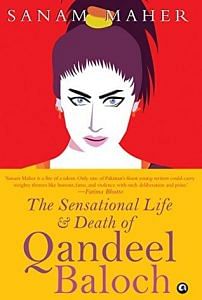Qandeel Baloch was not afraid to call out society’s hypocrisy. Sanam Maher, in this excerpt from ‘The Sensational Life and Death of Qandeel Baloch’ talks of the fierce Pakistani actor.
On another show, a few days later, she is one of three guests alongside an actress and a religious scholar who is the head of a well-known madrassa in Karachi. The host asks the scholar if, in his opinion, it is permissible for Qandeel to push the limits of freedom of expression the way that she does. Is she really allowed to make the kinds of videos that she does? Should she have offered to strip for the Pakistani cricket team? ‘So many evils are being born on social media,’ he replies. ‘She shouldn’t have done this. It’s obvious.’
Qandeel wears a black tank top and a fitted black blazer on that show. When the program airs, the channel has decided to place a blurred square where her cleavage would be had she been wearing something more revealing.
The actress chimes in that Qandeel is giving a bad name to the showbiz industry. It is because of people like her that girls from good homes will think twice before wanting to become an actress or singer.
‘If they are from good homes, then they should sit at home,’ Qandeel retorts. ‘Why do they want to come on TV?’
‘I believe these kind of people are just bubbles,’ the actress continues. ‘When did they come? When did they burst and disappear? Nobody will know. They just vanish.’
These female monkeys who curse me—do I go to their homes and force them to watch my videos? And then when their husbands complain and curse them, then they cry about ‘women empowerment’.
Qandeel does not expect these women, these actresses, to stand by her. She learned this when she starred in a reality TV show the year before. She had been sent to some village in Punjab with a crew of other aspiring actresses, models and singers to compete to be the ultimate ‘desi girl’—a ‘modern’ city girl who could survive in a village and carry out ‘tasks’ such as drawing water from a well, or carrying bales of hay from one spot to another
Did these women know, when they saw Qandeel pluck turnips in a field and crack a whip to spur a donkey cart forward, that she had grown up in a village not very different from this one? That she was playing at being a girl from the big city, and not a girl who had to learn to live in the village? She played the part well. In the very first episode, she had turned up in the village in her skinny jeans and stiletto booties—she could never go to Shah Sadar Din dressed as she was—and tripped and twisted her ankle in the churned mud of an unmade road. Those women on the reality show called her ‘proudy’ and voted her out. They turned against her. They made cliques. They did not want her there, Qandeel knows, because they knew she could win. Women rarely stand by her.
‘A woman gives a man permission to misbehave with her,’ the actress on the talk show tells Qandeel. ‘And you are one of those women who do, from what I have seen of you and heard of you and heard you say.’ A woman like Qandeel can only be the bright light of some man’s night, not the pride and joy of a home, she says.
Shut the fuck up.
The religious scholar tells her she has gone against Islamic law, the law of the country and Pakistani culture and manners. People like her want to see Western culture in Pakistan. ‘Our young men and women are being destroyed,’ he says. ‘We cannot allow it.’
When the host asks the scholar if he would pass a fatwa on Qandeel’s behaviour, Qandeel interrupts, ‘It’s my conscience and I have to go to my grave and give Allah an answer for what I have done. So no one here can try to pass any fatwas on me. There’s no need for that.’
‘I’m very happy her Facebook page was removed,’ the actress says at the end of the show. ‘In the future, if anyone tries to do something like that, they will think about the reaction first. The public, the people, will not be silent. They will say what is right and what is wrong. I don’t think she should behave this way ever again. No one should follow her. People like her should just be made to disappear.’
You’re going to miss me when I’m gone. Kitnay gunday hain aap log waisay (You’re so terrible), double standard log. You like to watch me, and then you like to say, ‘Why don’t you just die?’
Will you be happy when I die?
When I die, yahaan pe koi aur Qandeel Baloch nahin aani (There will never be another Qandeel Baloch).
Aik sau saal tak Qandeel Baloch paida nahin honi (For a hundred years, another Qandeel Baloch will not be born).
You’re going to miss me.
 Excerpted, with due permission, from The Sensational Life and Death of Qandeel Baloch’. Publisher Aleph.
Excerpted, with due permission, from The Sensational Life and Death of Qandeel Baloch’. Publisher Aleph.



